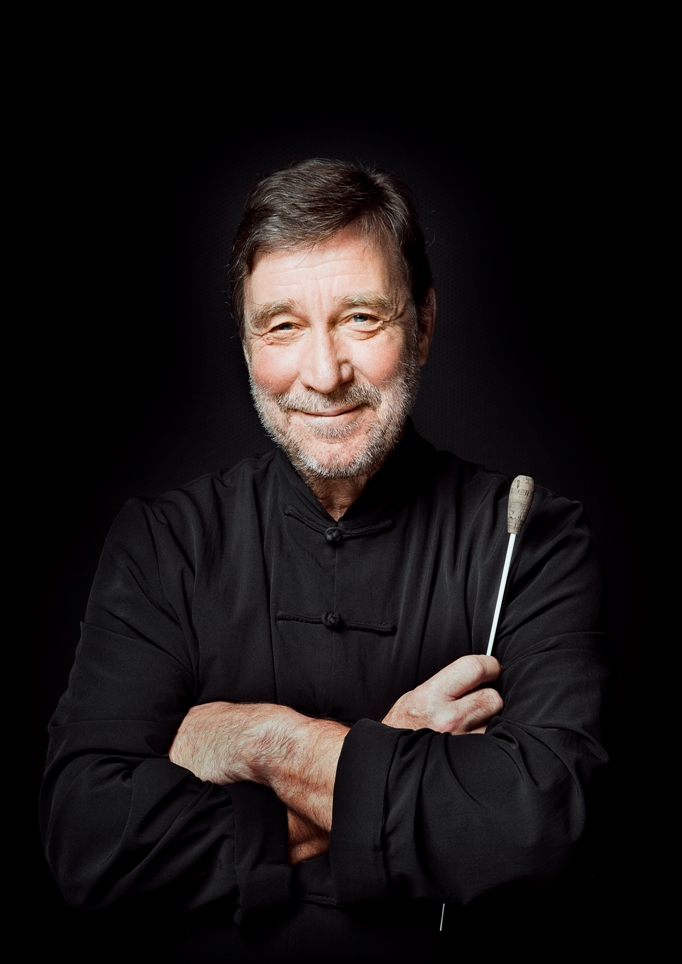Most pianists never truly master one of Brahms’s two piano concertos, those colossal symphonies for soloist and orchestra, let alone both. To present the two in one concert, then, seems foolhardy – and apparently was when András Schiff went for the marathon at the Edinburgh Festival during the Brian McMaster era. No-one expected anything but true majesty, though, when Elisabeth Leonskaja asked to do the same. The Scottish Chamber Orchestra duly obliged, taking up her suggestion of Okko Kamu, a Finnish master I haven’t seen for decades, as conductor. The result was almost off the Richter scale (Charles Francis rather than Sviatoslav, Leonskaja's mentor and duo partner, though that would do, too) of concert greatness.
To begin with, it was a splendid reversal of the usual concerto roles where the soloist is spotlit virtuoso while the orchestra and conductor play the supporting role. Under Kamu's seemingly effortless command (the conductor pictured below by Markus Henttonen), the SCO thundered into life, giving us a sense of how shockingly new it must have sounded to puzzled audiences when the 26-year old composer’s D minor giant was first unleashed in 1859, and gleaming, at least from my seat in the Usher Hall, like an especially translucent Berlin Philharmonic. Leonskaja’s entry was predictably grounding, unobtrusively placed, before she glided into introspection and rang out the double octaves in the wild development with surprising but judicious use of the sustaining pedal.
 This is a pianist who always gives effortless space when the phrases need it, but she has surely never had a partnership so fine-tuned to that space, than sense of absolute rightness in tempos and structure which I can only compare to Sir Charles Mackerras’s Mozart (most of it with the SCO, praise be – and Robin Ticciati’s Berlioz with the orchestra is heading in the same direction).
This is a pianist who always gives effortless space when the phrases need it, but she has surely never had a partnership so fine-tuned to that space, than sense of absolute rightness in tempos and structure which I can only compare to Sir Charles Mackerras’s Mozart (most of it with the SCO, praise be – and Robin Ticciati’s Berlioz with the orchestra is heading in the same direction).
Note-perfect in the torrents Leonskaja may not always have been, but nor were Richter, Schnabel or Cortot, giants with whom the pianist in her Indian Summer can be objectively compared. The point is that the passage-work is always directed, purposeful, aware of where the biggest rhetoric lies.
Leonskaja’s uncanniest trick is to roll a whole sequence of virtuoso rippling so evenly that time becomes space. Just when we thought it couldn’t get any deeper, she did just that in perfect league with the SCO’s two superb clarinettists, Maximiliano Martin and William Stafford, in the central stillness of the Second Piano Concerto’s Andante (impossible to judge which of the two slow movements is the greater). You wanted the suspensions to never end, to postpone the return of the great solo cello tune for even longer, though that was superbly taken by Richard Lester. He was the first of the principals to be blessed by Leonskaja, homaging the orchestra with total sincerity, at the end of the concert (and I was glad to see a row of students in the audience as the only standing ovationers, though the applause was deep and sustained).
Equally vital were the complementary horn solos of Alec Frank-Gemmill and Rebecca Hill, the very essence of dark-woods romanticism, along with the low pedal notes of all four horns, never more astonishing. Kamu and Leonskaja between them made the finales anything but simple rondos on a large scale; here they became miracles of unpredictability. I can count perfect concerto partnerships in live performance on the fingers of one hand, but this one goes straight to the top. How about the two big Tchaikovsky concertos next season?















Add comment